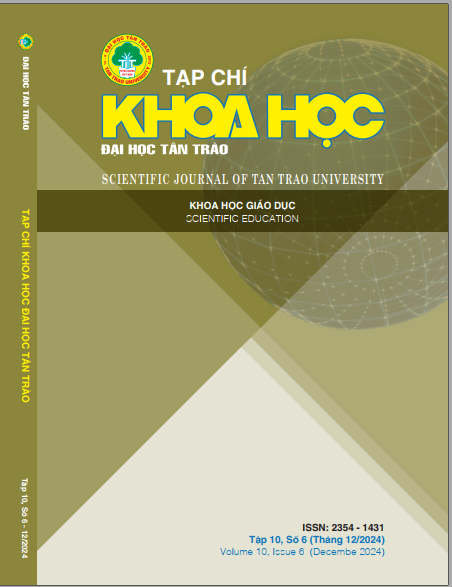THEORETICAL FOUNDATION FOR DEVELOPING EMOTIONAL REGULATION COMPETENCIES IN 5-6-YEAR-OLD CHILDREN THROUGH EXPERIENCE
DOI:
https://doi.org/10.51453/2354-1431/2024/1281Abstract
The article focuses on the theoretical foundation for developing emotional regulation skills in 5-6-year-old children through experiential learning, with the aim of helping children recognize, control their emotions, and develop social awareness. The research uses analysis and synthesis of theoretical literature from both domestic and international studies to establish a solid theoretical framework. The research findings indicate that 5-6-year-old children can identify and regulate their emotions through real-life experiences such as play, learning, and festivals. Children learn to recognize their own emotions as well as those of others, control their emotions in communication situations, and develop empathy. Developing emotional regulation skills through experience not only helps children manage their emotions but also contributes to the development of their personality and social abilities. The study provides a theoretical foundation to propose effective measures for enhancing emotional regulation skills in 5-6-year-old children through experiential learning in educational environments.
Downloads
References
Central Executive Committee. (2013). Resolution No. 29-NQ/TW dated November 4, 2013, “On fundamental and comprehensive renewal of education and training to meet the requirements of industrialization, modernization in the context of a socialist-oriented market economy and international integration”.
Ministry of Education and Training. (2012). Guidelines for organizing vocational education. Vietnam Education Publishing House.
Denham, S. A., et al. (2012). Emotional Development in Young Children. Guilford Press.
Zins, J. E., & Elias, M. J. (2006). Social and Emotional Learning: Promoting the Development of All Students. Journal of Educational Psychology, 98(4), 704-718.
Izard, C. (2001). Emotional intelligence or adaptive emotions. Emotion, 1(3), 249–257. https://doi.org/10.1037/1528-3542.1.3.249
Eisenberg, N., Spinrad, T. L., Fabes, R. A., Reiser, M., Cumberland, A., Shepard, S. A., ... & Thompson, M. (2004). The relations of effortful control and impulsivity to children's resiliency and adjustment. Child Development, 75(1), 25-46. https://doi.org/10.1111/j.1467-8624.2004.00652.x
Denham, S. A., & Brown, C. (2010). “Plays nice with others”: Social–emotional learning and academic success. Early Education & Development, 21(5), 652–680. https://doi.org/10.1080/10409289.2010.497450
Graziano, P. A., Reavis, R. D., Keane, S. P., & Calkins, S. D. (2007). The role of emotion regulation in children's early academic success. Journal of school psychology, 45(1), 3-19. https://doi.org/10.1016/j.jsp.2006.09.002.
Blair, C., & Diamond, A. (2008). Biological processes in prevention and intervention: The promotion of self-regulation as a means of preventing school failure. Development and psychopathology, 20(3), 899-911. https://doi.org/10.1017/S0954579408000436.
Epstein, A. S. (2009). Me, You, Us: Social-Emotional Learning in Preschool. HighScope Educational Research Foundation.
Goleman, D. (1995). Emotional Intelligence: Why It Can Matter More Than IQ. Bantam Books.
Medina, J. (2010). Brain Rules for Baby: How to Raise a Smart and Happy Child from Zero to Five. Premie Press.
Ngo, C. H. (2003). Emotions and emotional education for preschool children. Psychology Journal, 4, 11–14, 21.
Nguyen, M. A. (2009). "Emotional intelligence and the development of emotions and social skills in the new preschool education program." Proceedings of the conference, Central Pedagogical College, HCMC.
Tran, Đ. V. (2010). The secret to developing emotional skills for children to explore and enhance their EQ potential. The Era Publishing House.
Nguyen, T. T. H. (2012). Textbook on organizing children's play activities in preschool. Education Publishing House.
Nguyen, T. M. H. (2017). Social emotional education for preschool children in Vietnam. Psychology Journal, 10(5), 75–88
Le, T. M. A. (2016). The impact of emotional education on the social development of preschool-aged children. Labour - Social Affairs Publishing House.
Luong, T. B., & Margetts, K. (2013). Enhancing school readiness for preschool children in the area of emotional development and social skills education. Ministry of Education and Training.
Ðang, T. H. (2012). Competence and education based on a competence approach. Educational Management Journal, 43, 18-26.
Pham, M. H. (2013). Encyclopedic Dictionary of Vietnamese Psychology and Education. Vietnam Education Publishing House.
Thompson, R. A. (1994). Emotion regulation: A theme in search of definition. Monographs of the Society for Research in Child Development, 59(2-3), 25-52. https://doi.org/10.1111/j.1540-5834.1994.tb01276.x
Hoang, T. P. (Ed.). (2018). Organizing experiential educational activities for preschool children. University of Pedagogy Publishing House.
Downloads
Published
How to Cite
Issue
Section
License

This work is licensed under a Creative Commons Attribution-ShareAlike 4.0 International License.
All articles published in SJTTU are licensed under a Creative Commons Attribution-ShareAlike 4.0 International (CC BY-SA) license. This means anyone is free to copy, transform, or redistribute articles for any lawful purpose in any medium, provided they give appropriate attribution to the original author(s) and SJTTU, link to the license, indicate if changes were made, and redistribute any derivative work under the same license.
Copyright on articles is retained by the respective author(s), without restrictions. A non-exclusive license is granted to SJTTU to publish the article and identify itself as its original publisher, along with the commercial right to include the article in a hardcopy issue for sale to libraries and individuals.
Although the conditions of the CC BY-SA license don't apply to authors (as the copyright holder of your article, you have no restrictions on your rights), by submitting to SJTTU, authors recognize the rights of readers, and must grant any third party the right to use their article to the extent provided by the license.


